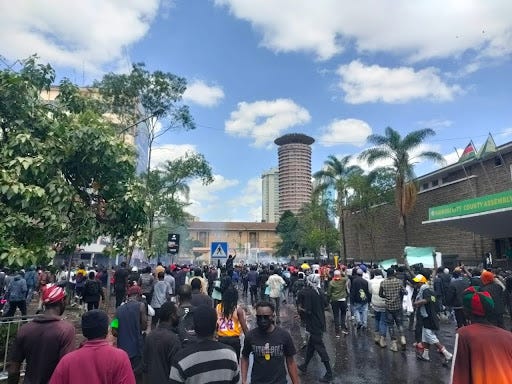
Kenya has been rocked by a wave of violent protests in recent weeks, ignited by a proposed tax hike included in the country’s 2024 finance bill. The unrest has resulted in multiple deaths, injuries, and raised concerns about the government’s response.
Fueling the Fire: An Unpopular Bill with Deep Roots
- Fuel: This rise hits Kenyans hard, especially those in rural areas who rely heavily on transportation for essential goods and services.
- Basic goods: With inflation already pushing up the cost of living, taxing essentials like cooking oil and flour further strains household budgets.
- Mobile money transactions: This tax taps into a vital financial tool for many Kenyans, particularly the unbanked, who rely on mobile money for everyday transactions.
The deep resentment towards the bill stems not just from the immediate financial burden, but also from a perception of a broken social contract. Many young Kenyans feel they haven’t benefited from previous government spending, yet are expected to shoulder a heavier tax burden.
From Protest to Unrest: A Nation Divided
The protests began peacefully but escalated on Tuesday, June 18th, 2024, when demonstrators stormed the Kenyan parliament building in Nairobi. Clashes erupted between protesters and police, leading to the use of tear gas and live ammunition. Reports indicate that at least five people were killed and dozens injured.
The violence spread to other major cities, including Mombasa and Kisumu, with reports of looting and property damage. New reports allege that several new, unfinished houses in Nairobi were set ablaze, symbolizing the dashed hopes of young Kenyans struggling to afford decent housing due to economic hardship.
The Aftermath: A Call for Dialogue and Accountability
In the wake of the violence, President William Ruto has vowed to maintain order and promised to review the proposed tax increases. However, his comments haven’t quelled the anger. Civil society groups have called for:
- An independent investigation into the use of force by police and the deaths of protesters.
- A more open dialogue with the public regarding the country’s economic challenges and the purpose of the tax hikes.
- Greater transparency in government spending to address concerns about mismanagement and corruption.
The Current Situation: A Tense Calm with Uncertainties
As of June 26th, 2024, a fragile calm has returned to Kenya. However, tensions remain high, and further protests are not out of the question. The government faces a critical juncture, needing to balance the need for increased revenue with the concerns of its citizens. Finding a solution that addresses both economic needs and social justice issues will be key to restoring long-term stability in Kenya.
